Related Research Articles

Pepsi is a carbonated soft drink with a cola flavor, manufactured by PepsiCo. It was originally created and developed in 1893 by Caleb Bradham in the United States, and became known as Pepsi-Cola in 1898, before shortening to Pepsi in 1961. As of 2023, Pepsi is the second most valuable soft drink brand worldwide behind Coca-Cola; the two share a long-standing rivalry in what has been called the "cola wars".

Mountain Dew, stylized as Mtn Dew in some countries, is a carbonated soft drink brand produced and owned by PepsiCo. The original formula was invented in 1940 by Tennessee beverage bottlers Barney and Ally Hartman. A revised formula was created by Bill Bridgforth in 1958. The rights to this formula were obtained by the Tip Corporation of Marion, Virginia. William H. "Bill" Jones of the Tip Corporation further refined the formula, launching that version of Mountain Dew in 1961. In August 1964, the Mountain Dew brand and production rights were acquired from Tip by the Pepsi-Cola company, and the distribution expanded across the United States and Canada.
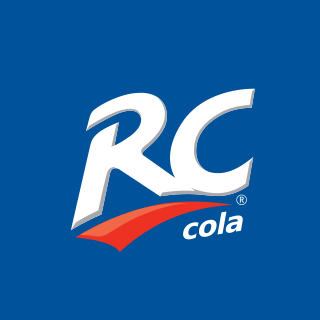
RC Cola is a cola-flavored carbonated beverage owned in the U.S. by U.S. coffee and beverage company, Keurig Dr Pepper, and owned outside the U.S. by RC Global Beverages, Inc.

John Sculley III is an American businessman, entrepreneur and investor in high-tech startups. Sculley was vice-president (1970–1977) and president of PepsiCo (1977–1983), until he became chief executive officer (CEO) of Apple Inc. on April 8, 1983, a position he held until leaving in 1993. In May 1987, Sculley was named Silicon Valley's top-paid executive, with an annual salary of US$10.2 million.

Product placement, also known as embedded marketing, is a marketing technique where references to specific brands or products are incorporated into another work, such as a film or television program, with specific promotional intent. Much of this is done by loaning products, especially when expensive items, such as vehicles, are involved. In 2021, the agreements between brand owners and films and television programs were worth more than US$20 billion.

New Coke was the unofficial name of a reformulation of the soft drink Coca-Cola, introduced by The Coca-Cola Company in April 1985. It was renamed Coke II in 1990, and discontinued in July 2002.

Crystal Pepsi is a clear cola soft drink made by PepsiCo. It was initially released in the United States and Canada from 1992 to 1994. Online grassroots revival efforts prompted brief re-releases throughout the mid-2010s. It was briefly sold in the United Kingdom and Australia.

Pepsi Max is a low-calorie, sugar-free cola, marketed by PepsiCo as an alternative to Pepsi and Diet Pepsi. Pepsi Max is available primarily in Asian and European markets. While Pepsi Max was released on April 5, 1993, it was first available on store shelves in the United States in 2007.

Diet Pepsi is a diet carbonated cola soft drink produced by PepsiCo, introduced in 1964 as a variant of Pepsi with no sugar. First test marketed in 1963 under the name Patio Diet Cola, it was re-branded as Diet Pepsi the following year, becoming the first diet cola to be distributed on a national scale in the United States. In the 1960s and 1970s, its competition consisted of the Coca-Cola Company's now-discontinued Tab. The United States represents the largest single market for Diet Pepsi.

PepsiCo, Inc. is an American multinational food, snack, and beverage corporation headquartered in Harrison, New York, in the hamlet of Purchase. PepsiCo's business encompasses all aspects of the food and beverage market. It oversees the manufacturing, distribution, and marketing of its products. PepsiCo was formed in 1965 with the merger of the Pepsi-Cola Company and Frito-Lay, Inc., PepsiCo has since expanded from its namesake product Pepsi Cola to an immensely diversified range of food and beverage brands. The largest and most recent acquisition was Pioneer Foods in 2020 for US$1.7 billion and prior to it was buying the Quaker Oats Company in 2001, which added the Gatorade brand to the Pepsi portfolio and Tropicana Products in 1998.
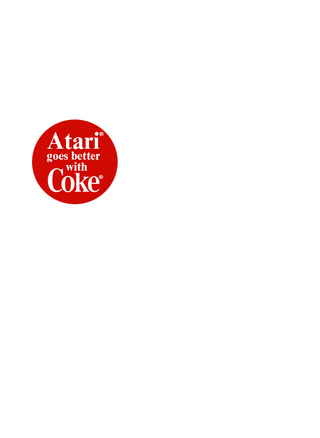
Pepsi Invaders is a non-commercially released 1983 fixed shooter video game developed by Atari, Inc. for the Atari 2600. It was commissioned by The Coca-Cola Company to be handed out to salespeople at their 1983 sales convention. A reskin of the system's version of Space Invaders, the player shoots down a flying formation of letters spelling "PEPSI", Coca-Cola's long-time rival. Only 125 copies were distributed.
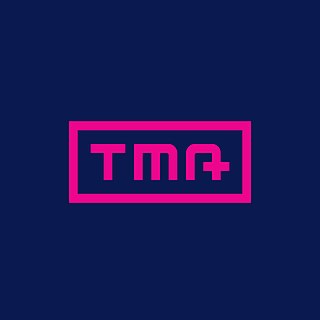
TMA is a marketing and creative agency owned by Omnicom Group. With offices in New York City; Los Angeles; Chicago; Dallas; Wilton, Connecticut; Irvine, California; London; Manchester; São Paulo; and Shanghai. The agency specializes in strategy and execution across sports and entertainment, experiential, celebrity and influencer, digital and social, shopper and promotion, and content production.

Advertainment is a term used to reflect the intertwining relationships between advertising and entertainment. Typically it refers to media that combines various forms of entertainment with elements of advertising to promote products or brands. An example would be product placement in a film. The word is a portmanteau of advertising and entertainment.

Diet Pepsi Jazz was an American brand of soda introduced by the Pepsi company in 2006 and discontinued in 2009. It was a specifically named variant of Pepsi's popular Diet Pepsi product, combining several different flavors.
In marketing, branded content is content produced by an advertiser or content whose creation was funded by an advertiser. In contrast to content marketing and product placement, branded content is designed to build awareness for a brand by associating it with content that shares its values. The content does not necessarily need to be a promotion for the brand, although it may still include product placement.

"Move Over", also known as "Generation Next", is a song by English girl group the Spice Girls from their second studio album, Spiceworld (1997). The song was originally co-written by Clifford Lane with Mary Wood as a jingle for PepsiCo's "GeneratioNext" advertising campaign and used in television ads released in January 1997. Through Abbott Mead Vickers BBDO, the Spice Girls signed an endorsement deal with Pepsi in early 1997, that consisted of the release of an exclusive CD single, TV commercials, on-can and bottle promotion and the group's first live concerts in Turkey.
The Pepsi Generation, is the theme of an advertising campaign for Pepsi-Cola, a US brand of soft drink, that launched in 1963 as the result of a slogan contest. A new car was awarded to the writer of the winning slogan. The contest was the brainchild of Alan Pottasch, a PepsiCo advertising executive, and it was won by Appleton, Wisconsin resident, Ellen M. Reimer. Her slogan invited consumers to "Come Alive! You're the Pepsi Generation!" The original "Come Alive" jingle was performed by singer Joanie Sommers in her memorable "breathy" vocal style. As of 2021, this logo is still used on merchandising.

The Pepsi Globe is the logo for Pepsi, named for the red, white, and blue design in a sphere-like shape. It is one of the most recognizable logos in the world.
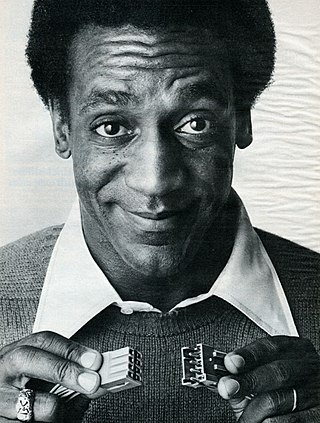
American comedian and actor Bill Cosby was a popular spokesperson for advertising from the 1960s – before his first starring television role – until the early 2000s. He started with White Owl cigars, and later endorsed the Jell-O frosty ice pop treats Pudding Pop, gelatin, Del Monte, Ford Motor Company, Coca-Cola, American Red Cross, Texas Instruments, E. F. Hutton & Co., Kodak, and the 1990 United States Census. As of 2002, Cosby held the record for being the longest-serving celebrity spokesperson for a product, through his work with Jell-O. In 2011, he won the President's Award for Contributions to Advertising from the Advertising Hall of Fame.
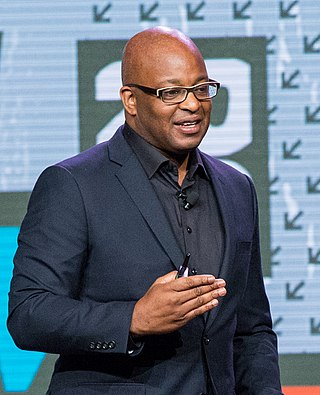
Frank Cooper III is a business executive, branded entertainment leader and current Chief Marketing Officer for Visa. Cooper was earlier CMO of BlackRock, CMO/Chief Creative Officer of BuzzFeed and served as CMO of Global Consumer Engagement for PepsiCo, Inc.
References
- ↑ "Davie-Brown Entertainment". LA 411. Retrieved 1 March 2017.
- ↑ Donaton., Scott (2004). Madison & Vine, Why the Entertainment and Advertising Industries must Converge to Survive. New York: McGraw Hill. ISBN 0-07-143684-7.
- ↑ Inside Branded Entertainment Tom Meyer interview, Archived February 19, 2006, at the Wayback Machine
- ↑ "Boards Online, September 20, 2001". Archived from the original on September 27, 2007. Retrieved April 12, 2007.